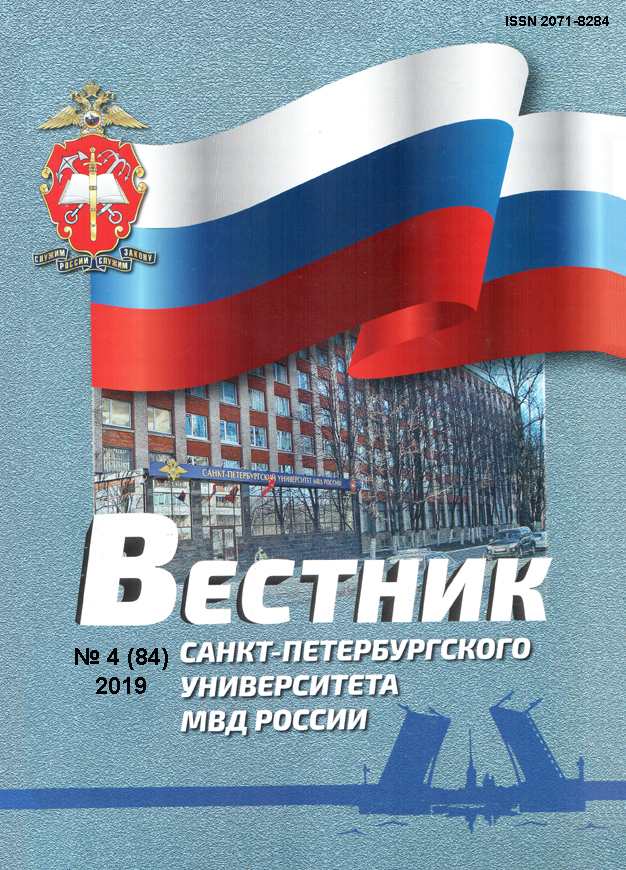Russian Federation
UDC 34
CSCSTI 10.09
The majority of interpretations of social authority is based upon its definition by M. Weber as an opportunity to exercise one’s will even against the will of other persons. In this context the authority constitutes a capacity of an individual or a community of people to force others (own members) to a certain type of conduct. In the primitive society the authority was natural, direct and detached neither from anindividual nor from a team, in general. The appropriation and xercise of authority was “interwoven” in daily activities of people and the observance (collective subordination to) of certain rules of conduct was ultimately essential for survival and thus natural and indisputable. The development of production activities of an individual and its sociality, in broad terms, led to the division of labor, inter alia, to segregation of the ruling and managerial activities and the consequent isolation of private and public areas of activity of an individual, attribution of the degree of publicity to social authority. Public authority is institutionalized authority; it is appropriated by artificial ways developed by the society and exercised through specially designated persons for these purposes (established entities) within the framework of the set procedures based on the territorial principle. Public authority is universal; it extends to all society members and to the entire area of their public activities. Once emerged in a socially stratified society, public authority inevitably acquires political nature – it is aimed at streamlining relationships between various groups and layers of the society and alignment (delineation, suppression) of their interests. This particular comprehension of public political authority underpins various definitions of the state which basically come down to the most efficient (sovereign) as well as (in a set of conceptions) proper (fair, legitimate, legal etc.) form of its organization.
authority, public authority, political authority, primitive society, division of labor, legitimacy, state
1. Alekseev N. N. Ocherki po obschey teorii gosudarstva. Osnovnye predposylki i gipotezy gosudarstvennoy nauki / pod red. V. A. Tompsinova. - Moskva: Zercalo, 2008. - 216 s.
2. L'yuks S. Vlast': Radikal'nyy vzglyad / perevod s angl. A. I. Kyrlezheva. - Moskva: Izdatel'skiy dom Gosudarstvennogo universiteta - Vysshey shkoly ekonomiki, 2010. - 240 s.
3. Isaev I. A. Metafizika Vlasti i Zakona: U istokov politiko-pravovogo soznaniya. - Moskva: Yurist', 1998. - 256 s.
4. Ledyaev V. G. Vlast': konceptual'nyy analiz. - Moskva: Rossiyskaya politicheskaya enciklopediya (ROSSPEN), 2001. - 384 s.
5. Gallie W. B. Essentially Contested Concepts // Proceedings of the Aristotelian Society. - 1956. - Vol. 56. - Issue 1. - P. 167-198.
6. Waldron J. Vagueness in Law and Language: Some Philosophical Issues // California Law Review. - 1994. - Vol. 82. - No. 3. - P. 509-540.
7. Latour B. The Powers of Association / Power, Action and Belief: A New Sociology of Knowledge? / ed. by J. Law. - London; Boston: Routledge & Kegan Paul, 1986. - P. 264-280.
8. March J. The Power of Power / Varieties of Political Theory / ed. by D. Easton. - Englewood Cliffs: Prentice-Hall, 1966. - P. 39-70.
9. Weber M. The Theory of Social and Economic Organization. - New York: Oxford University Press, 1947. - 436 p.
10. Weber M. Economy and Society / ed. by G. Roth, C. Wittich. - Berkeley; Los Angeles: California University Press, 1978. - 1462 pp.
11. Baturin Yu. M., Livshic R. Z. Socialisticheskoe pravovoe gosudarstvo: ot idei - k osuschestvleniyu (politiko-pravovoy vzglyad). - Moskva: Nauka, 1989. - 256 s.
12. Parsons T. Sociological Theory and Modern Society. - New York: Free Press, 1967. - 564 p.
13. Parsons T. Power and the Social System / Power / ed. by S. Lukes. - Oxford: Blackwell, 1986. - P. 94-143.
14. Arendt H. On Violence. - London: Allen Lane, 1970. - 106 p.
15. Arendt H. Communicative Power / Power / ed. by S. Lukes. - Oxford: Blackwell, 1986. - P. 59-74.
16. Aristotel'. Politika (1253a.9) / per. S. A. Zhebeleva / Aristotel'. Sochineniya: v 4 t. - T. 4. - Moskva: Mysl', 1983. - S. 376-644.
17. Childe G. V. Man Makes Himself. - London: Watts & Co., 1936. - 275 p.
18. Engel's F. Proishozhdenie sem'i, chastnoy sobstvennosti i gosudarstva. V svyazi s issledovaniyami L'yuisa G. Morgana // Marks K., Engel's F. Soch. / 2-e izd. - T. 21. - Moskva: Gosudarstvennoe izdatel'stvo politicheskoy literatury, 1961. - S. 23-178.
19. Ellinek G. Obschee uchenie o gosudarstve. - Sankt-Peterburg: Yuridicheskiy centr Press, 2004. - 752 s.
20. Veber M. Osnovnye sociologicheskie ponyatiya / Izbrannye proizvedeniya. - Moskva: Progress, 1990. - S. 602-642.
21. Lipset S. M. Politicheskaya sociologiya / Amerikanskaya sociologiya. Perspektivy. Problemy, Metody. - Moskva: Progress, 1972. - S. 203-219.
22. Chetvernin V. A. Gosudarstvo: suschnost'. Ponyatie, struktura. Funkcii / Problemy obschey teorii prava i gosudarstva / pod red. V. S. Nersesyanca. - Moskva: Izdatel'skaya gruppa Norma - Infra-M, 1999. - S. 515-642.
23. Varlamova N. V. Problemy institucionalizacii nadnacional'nogo urovnya osuschestvleniya publichno-vlastnyh polnomochiy // Trudy Instituta gosudarstva i prava RAN. - 2014 - № 6. - S. 8-34.














